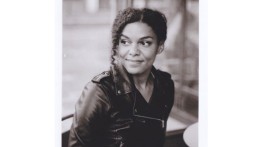Nadia Yala Kisukidi | Lumumba’s dream
Saturday, May 8, 2021, 12 - 1:30pm

Photo by Emilie Notéris
In everyday language, a dream refers to an ideal projection, imagined in a waking state. Dreamers are not considered to be very productive or to be men/women of action. Within the political field, the whole semantics of the dream is spontaneously disqualified. Nevertheless, it is possible to aesthetically, philosophically, and politically re-signify the state of conscious dreamers. In this free, public online lecture as part of the Spring 2021 Intra-Disciplinary Seminar Nadia Yala Kisukidi aims to reread the history of African Independences through the idea of “lucid dream” or “waking dream”. She will try to show, through the political hopes of Patrice Emery Lumumba (1925-1961), how it is possible to dismantle a history of defeat and emphasize the long survival of traditions of political struggle.
Kisukidi was born in Brussels to a Congolese (DRC) father and a Franco-Italian mother. She is Associate Professor of philosophy at Paris 8 Vincennes-Saint-Denis University, and co-director of the research center “Les logiques contemporaines de la philosophie” (LLCP). A former vice-president of the Collège International de Philosophie (2014-2016), she is on the editorial committee of Critical Time (Duke University) and is co-curating the Yango II Biennale, Kinshasa / RDC (2021). Nadia Yala Kisukidi specializes in French and Africana philosophy. A holder of the agrégation, she has taught in Switzerland and France, and contributed to the creation of a “Global South” research network between Haïti, France, and Colombia. She has published many articles and books (monographs and edited volumes) in the field of philosophy.
The IDS public lecture series is part of the Robert Lehman Visiting Artist Program at The Cooper Union. We are grateful for major funding from the Robert Lehman Foundation. The IDS public lecture series is also made possible by generous support from the Open Society Foundations.




